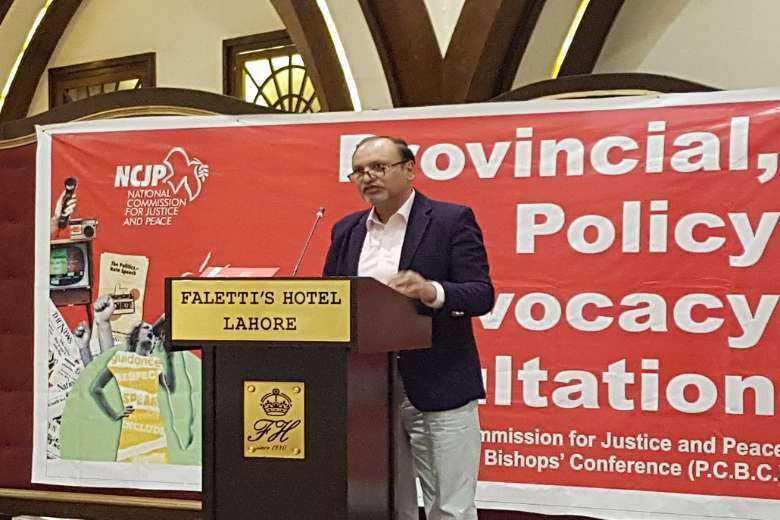
Naeem Yousaf Gill, executive director of the National Commission for Justice and Peace, at the launch of the policy brief on hate speech in Punjab on March 17. (Photo: Kamran Chaudhry/UCA News)
A new study published by a bishops' commission highlights the psychological impact of hate speech on religious and sectarian minorities in Pakistan's Punjab province.
“Hate speech in Pakistan is accepted as a norm. One of its immediate effects is that people experience a loss of self-esteem. There is a constant fear among minority community members regarding their security and survival. A Hindu student reported losing her interest in studies, claims the study titled “The cost of hate speech.”
It was based on 12 focus group discussions, held between February 2020 and February 2021, with about 200 individuals including Christians, Hindus, Sikhs, Shia and Ahmadi in both educational institutes and public places around Punjab. Similar sessions will be conducted in urban and rural areas of the three other provinces.
The National Commission for Justice and Peace (NCJP), the Church's human rights body in Pakistan, launched its policy brief for Punjab in Lahore on March 17.
The commission made several recommendations including monitoring and regulating religious sermons and seminary curriculum, reforming the education system, a government policy on non-discrimination, a media campaign to promote equality as well as federal and provincial committees to monitor hate speech.
According to Aila Gill, program coordinator of NCJP, this is the first time such data has been collected in the country.
“We have identified more than 50 hateful terms. A lexicon has been prepared with suggestive terminologies preferred by the different minority communities,” she told UCA News.
“Religious minorities generally don’t know derogatory hate speech experienced in daily life and have become immune to this common phenomenon. Most of them hide their religious identities and never report such incidents for fear of retaliation. They demand support from the majority community to register complaints against hate speech.”
A press statement by NCJP, also released on March 17, blames the “deteriorating situation of freedom of religion or belief” for the increase in hate speech in the country.
“Hate speech has severe implications in society as it often leads to violent attacks on religious minorities. Policy brief of Punjab on hate speech is designed to communicate the existing legal framework concerning hate speech and the lacunas in the legal framework,” it states.
Amid rising blasphemy cases and forced conversions, Punjab Minister for Human Rights, Minorities Affairs and Interfaith Harmony Ejaz Alam Augustine launched Pakistan's first policy on interfaith harmony in January.
Christians are the largest non-Muslim minority in Punjab, making up 2.6 percent of the province's population of 110 million.


